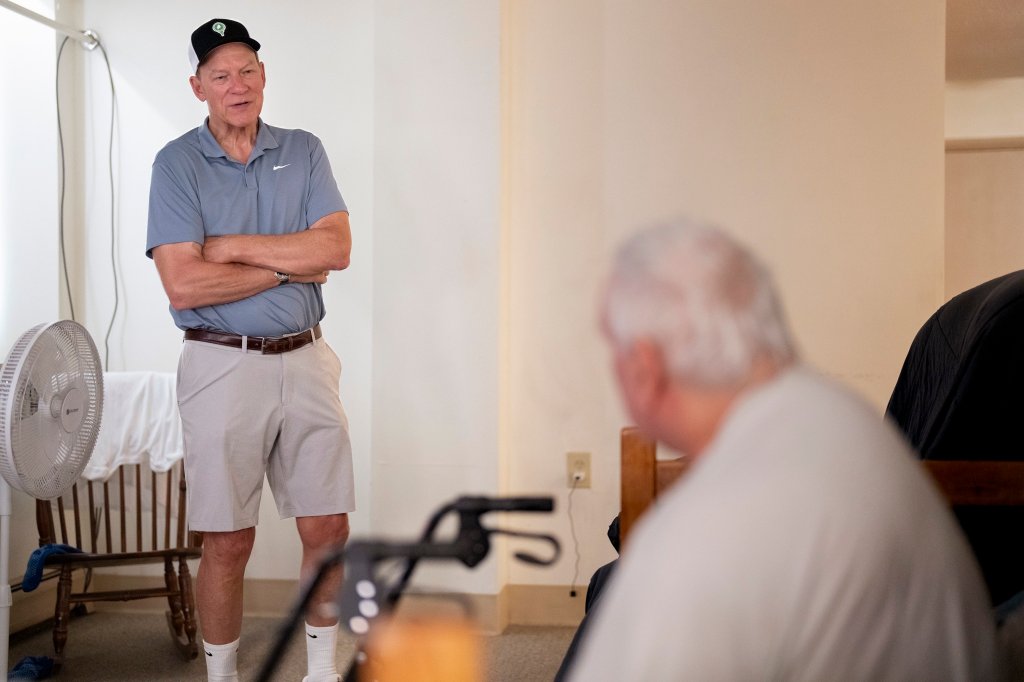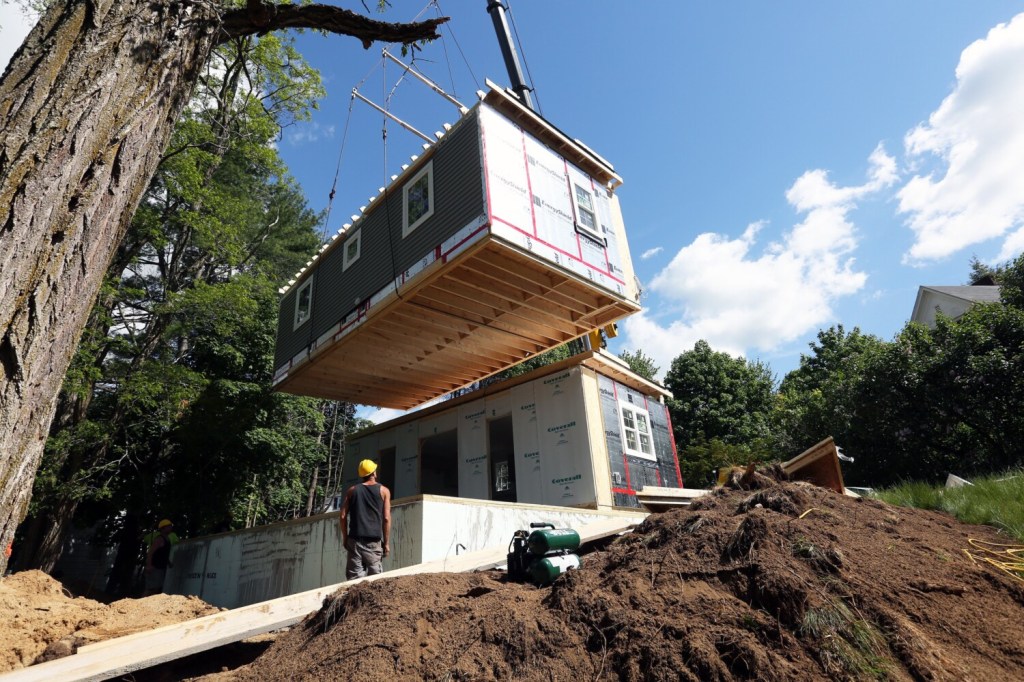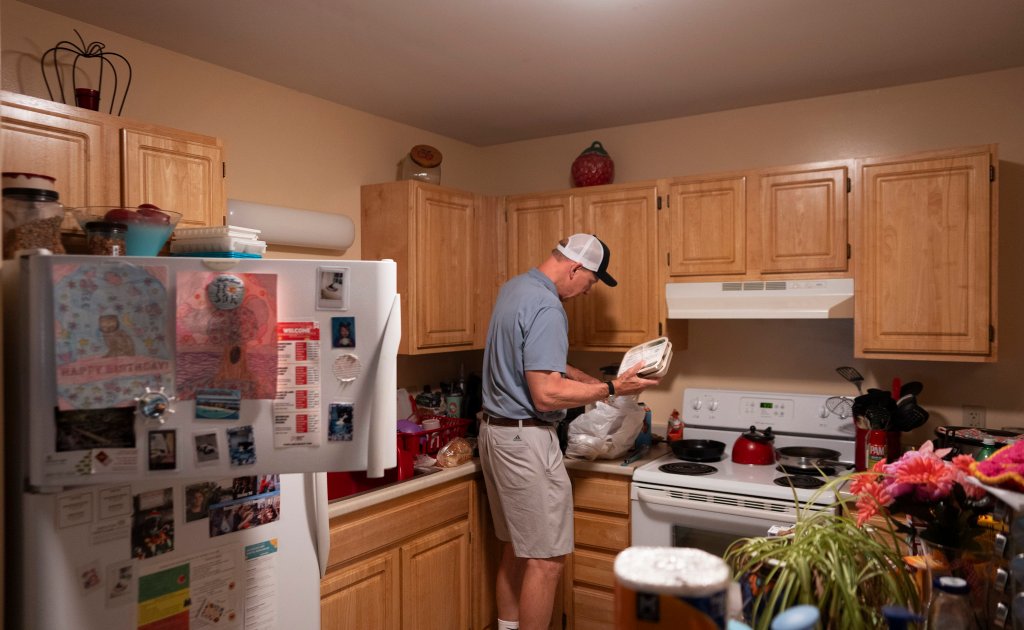
The scenario plays out over and over, in communities of all sizes across Maine.
An older resident retired years ago and lives in a home they have long since paid off, relying on their small, fixed income to get by. But costs keep creeping up — groceries, prescription drugs, health care, transportation — and there is nothing left for upkeep on their house.
Then costs go up even more, forcing that person to choose between medication or groceries and heating their home through the coldest stretches of winter.
More than half of single, older Mainers cannot afford basics like food and housing — a complex challenge with no easy solution.
“We have in this state a really clear divide between haves and have-nots when it comes to older folks,” said Jess Maurer, executive director of the Maine Council on Aging. “If you have significant resources, you can do OK. And if you don’t, you can’t.”
Nationwide, about 20% of adults over 50 have no retirement savings, and 61% worry they will not have enough money to support themselves in retirement, an AARP survey found.
Megan Walton, CEO of the Southern Maine Agency on Aging, said people are living longer than they ever did before, making affordability for older residents one of the most critical issues now facing Maine.
The average life expectancy in Maine is now 77.8, and more people are living into their 80s, 90s or beyond. Many of those people retired in their 60s and have lived on retirement savings or Social Security for decades.
In Maine, 36% of people older than 60 have an average annual income of $20,000 or less. Women over 75, who typically earned less during their careers and had to take time off for caregiving, live in poverty at twice the rate of men, according to the U.S. Census Bureau.
“Health care, transportation, Social Security — all of these systems have not caught up,” Walton said. “The cost of groceries and housing and getting to where you need to go have gone up. If you’re living on a fixed income, this is resulting in some pretty dramatic decisions.”
When people on such tight budgets face increases in basic necessities, they end up making hard decisions about how to stretch their money, said Noël Bonam, director of AARP Maine.
“They have to decide if they’re going to take half a pill because they need to heat their homes for the winter,” he said.
HOUSING COSTS
The overall cost of living in Maine is higher than the national average, and in rural areas, a quarter of older adults spend more than 35% of their income on housing, Bonam said.
There is a high demand for affordable housing units designated for older people, but waitlists for them consistently range from three to five years.
For those who do manage to get into affordable housing, it can still be difficult to pay rent on a fixed income.
Maurer said she hears over and over again of people who sold their house 20 years ago when they retired and got into an affordable unit, but no longer have enough income and have spent down their savings.
In urban areas, organizations say they are increasingly working with people who have lived in the same apartment for decades, only to be forced out when the building is sold or the landlord raises the rent. When that happens, not everyone is able to find another place to live.
“The fastest growing cohort of homeless people in the nation is people over the age of 50,” Walton said. “This is only going to become more magnified as time goes by.”
People who live in mobile home communities are increasingly facing pressure from lot rent increases. Residents concerned about the price hikes have tried to purchase parks when they go on the market, with mixed results.
Some communities, including Sanford and Waterville, have put moratoriums in place to temporarily halt increases while officials develop rent stabilization ordinances. Old Orchard Beach residents last year approved a rent stabilization ordinance for mobile home parks that caps annual increase at 5%, except under special circumstances.
Last spring, the Legislature passed bills giving mobile home residents “the right of first refusal” when their parks go up for sale and establishing a permanent fund to help mobile home owners purchase their parks, giving them more say over future rent increases and operations.
Many older homeowners are struggling to keep up with dramatic property tax increases, Bonam said, and some houses are at risk of becoming uninhabitable because residents can’t afford upkeep.
“When you look at the housing crisis in the state, a lot of older adults live in homes they built and have lived in for decades,” Bonam said. “They cannot live in the homes they were hoping to stay and die in because they can’t afford the property taxes or the expenses for upkeep.”

LOOKING FOR HOUSING SOLUTIONS
The state has made efforts to address the housing issues, including creating pockets of new senior affordable units.
The Property Tax Fairness Credit can also provide up to $2,000 annually to help qualified homeowners 65 and older with housing costs.
Three years ago, Maine lawmakers passed a landmark bill designed to increase home construction and ease the housing crisis by making it legal to put multiple accessory dwelling units on all single-family lots statewide.
Sometimes called granny flats or in-law suites, ADUs are small residences — usually 600 to 1,000 square feet — that share a single-family lot with a larger, primary dwelling. They’re often used as housing for family members or rented out for supplemental income.
That effort was broadly supported by affordable housing advocates and by those who work with older Mainers as a way to help people stay in their homes.
“We really want older adults to live in their homes in their communities for as long as they possibly can,” Bonam said. “They built a life in that community. That’s their safe haven and where they envision growing old.”
Allowing ADUs can help accomplish that by giving people extra revenue from renting out the unit. In many cases, it may also mean that a family caregiver can live on the same property as the older resident and help with their care, Bonam said.
FOOD INSECURITY
A disproportionate number of older Mainers experience food insecurity, meaning they don’t have reliable access to affordable and nutritious food. According to the nonprofit organization Feeding America, 40,000 Mainers over 50 are food insecure.
Older Mainers who don’t have enough food are more than twice as likely to report their health is fair or poor, according to Good Shepherd Food Bank. They face an increased risk of chronic health conditions, including diabetes, high blood pressure, depression and congestive heart failure.

Meals on Wheels, which delivers food to more than 10,000 Maine residents, has a waitlist of over 700 people. The program, funded in part by the federal government and run in Maine by the agencies on aging, is a critical lifeline that has been shown to reduce hospitalizations and nursing home placements.
Earlier this year, the Legislature approved $3 million to support Meals on Wheels and other aging services.
People on fixed incomes are feeling the pressure of rising grocery prices, but many who would qualify for the Supplemental Nutrition Assistance Program, formerly known as food stamps, are not taking advantage of that resource, Walton said.
Walton said some people hear that the amount of assistance they would receive is low and not worth going through the application process. But now, even an extra $25 for groceries really helps, she said.
Food assistance is also available through the Maine Senior FarmShare Program, which provides low-income adults with $50 worth of local produce from local farmers during the growing season.
HELP IS AVAILABLE
There are a variety of programs in place to help older Mainers who are struggling to get by, but experts say more is needed as the state’s population ages.
Walton said she always encourages people to reach out to their local agency on aging to talk about available resources.
For those who need help heating their homes, the Home Energy Assistance Program (HEAP) helps qualified homeowners and renters provide assistance with fuel costs and emergency fuel deliveries. Some people also qualify for energy-related repairs and utility payments.
In recent years, a network of wood banks has expanded across the state. The programs, largely run by volunteers, provide firewood to help people keep their homes warm through winter.
People with low incomes or disabilities who need help keeping up with home repair may qualify for the Community Aging in Place Grant Program, which offers no-cost home safety checks, minor repairs and accessibility modifications.
MaineHousing’s Home Accessibility and Repair Program provides low-income homeowners grants for a variety of home projects, including repairs to roofs, heating and electrical systems, and siding.
Medicare enrollees should expect increases in premiums, deductibles and cost shares in 2026. There will also be shifts in prescription medications covered by plans.
Experts warn that coverage will be harder to maintain as eligibility renewals move from annually to every six months, and retroactive coverage shrinks to one or two months.
Help with prescription and over-the-counter medications is available through the Maine Low Cost Drug Program for the Elderly and Disabled. There are income and asset tests to qualify.

Two years ago, the Legislature expanded eligibility for the Medicare Savings Program. It helps low-income Mainers — typically those 65 or older who are eligible for Medicare — by reducing or eliminating out-of-pocket costs for premiums, deductibles and co-payments. For instance, the Medicare Savings Program pays for the Part B premium, which is usually deducted from Social Security income.
Part B is an optional program under Medicare, but many choose to get it because it pays for common outpatient services, screenings and exams. Benefits can vary but typically amount to $7,300 per year for an individual.
Maurer said that expansion allows about 100,000 older people in Maine to qualify for the program and has had a noticeable impact.
“It’s lifted them out of poverty,” she said. “It’s saved people’s lives. It’s kept them in housing. It’s been remarkable.”
Our Aging in Maine series explores ways to prepare for retirement, navigate the challenges of growing older and deepen community connections. More stories will publish throughout October, and all articles will run in a special print section of the Maine Sunday Telegram on Oct. 19.


We invite you to add your comments. We encourage a thoughtful exchange of ideas and information on this website. By joining the conversation, you are agreeing to our commenting policy and terms of use. More information is found on our FAQs. You can modify your screen name here.
Comments are managed by our staff during regular business hours Monday through Friday as well as limited hours on Saturday and Sunday. Comments held for moderation outside of those hours may take longer to approve.
Join the Conversation
Please sign into your CentralMaine.com account to participate in conversations below. If you do not have an account, you can register or subscribe. Questions? Please see our FAQs.